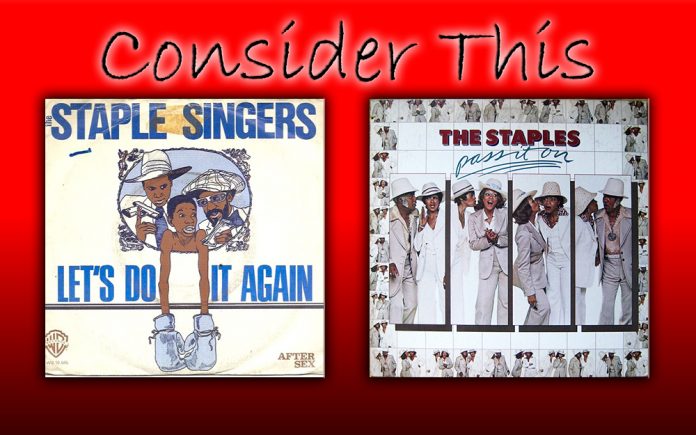
By Eleni P. Austin
Chicago has been the birthplace for a lot of great music. That rich history began nearly a century ago when Black workers began migrating from the South to find industrial jobs in the North. The confluence of Jazz, Gospel and Blues was immediately felt. Muddy Waters, Nat King Cole, Junior Wells, Howlin’ Wolf, Gene Ammons and both Sonny Boy Williamsons are just a few of the legendary artists that got their start there.
Two of the greatest acts to emerge from the Windy City were Curtis Mayfield and The Staple Singers. They each got their start in Gospel music, but as their careers progressed both found ways to incorporate Jazz, R&B and Blues, resulting in a Soulful alchemy.
The Staple Singers got their start on the Gospel circuit and turned professional in the ‘50s. A true family affair, the act featured Mavis out front along with sisters Cleotha, Yvonne and brother Pervis. Their dad, Robuck “Pops” Staples played guitar.
Their music was steeped in traditional Gospel and Folk, but as they continued to hone their sound, they began blending more secular influences. They added sanctified heft to Bob Dylan’s “A Hard Rain’s A-Gonna Fall,” Buffalo Springfield’s “For What It’s Worth” and “The Weight” by the Band. Each song exhibited a spiritual subtext that mirrored the struggles of the Civil Rights movement.
In 1968, The Staple Singers signed with the Stax/Volt label. Small, in comparison to R&B hit machines like Motown and Atlantic, it was founded in 1957. The Stax recording studio was situated in a converted movie theater in Memphis, Tennessee. Despite their small size, the label boasted an impressive roster of artists including Booker T. & The MG’s, Otis Redding, Isaac Hayes, Eddie Floyd, Johnny Taylor, Rufus Thomas and his daughter Carla and Sam & Dave.
The Staples found their greatest critical and commercial success on Stax, charting eight songs in the Top 40. Hits included “Respect,” “I’ll Take You There” and “If You’re Ready (Come Go With Me). Their music offered a potent combo-platter that matched themes of self-empowerment and spiritual fulfillment with infectious Soul-Funk melodies that featured prickly harmonies, and tight instrumentation.
The Staples seemed to lose their footing during the Disco era, even though Mavis remained in the group, she also embarked on a solo career. Her output was sporadic in the ‘70s and ‘80s, but in 1989, she was courted by mega-fan Prince, and he convinced her to sign with his Paisley Park label. He wound up producing the two albums she recorded under his aegis. In 1996, she returned to her Gospel roots with Spirituals And Gospels: Dedicated To Mahalia Jackson. The Staples were inducted into the Rock & Roll Hall Of Fame in 1999. Sadly, a year later Pops died from complications he sustained from a concussion.
In the last 20 years, Mavis has released a series of rewarding albums, mostly released on Anti-, an independent label that began life as an offshoot of the Punk label, Epitaph. Collaborating with younger musician/producers like Ry Cooder and Wilco front-man Jeff Tweedy, she created instant classics like “We’ll Never Back Down,” “You Are Not Alone,” “Livin’ On A High Note” and “If All I Was Was Black.”
Not only has she won multiple awards and reinvigorated her career, she’s also introduced her music to younger generations by playing festivals like Bonaroo and Coachella. Her most recent effort is a live album, recorded in London in time for her 80th birthday. She remains committed to social change and has been at the forefront of the Black Lives Matter movement.
Curtis Mayfield’s career ran parallel to the Staple Singers. He got his start singing in a Gospel choir in the ‘50s. He segued into secular music in the early ‘60s when he became lead singer and primary songwriter for The Impressions. By 1965, he wrote their first #1 hit, the politically charged “People Get Ready.”
In 1970 he struck out on his own, launching a solo career. He released a string of brilliant albums that married socially conscious, occasionally controversial lyrics to impossibly catchy melodies that were anchored by electrifying instrumentation and innovative arrangements. His soundtrack to the 1972 Blaxploitation film, “Superfly,” was a watershed moment, heralded as a powerful touchstone for the nascent Hip-Hop community.
Although his career cooled in the ‘80s, Curtis continued to record and tour. In August, 1990, he became paralyzed from the neck down after a lighting rig fell on him at an outdoor concert venue in Brooklyn. Still, he managed to write and record. He made his final album, New World Order lying on his back, recording his vocals line by line. It was released in 1996. A year earlier, he had received a Grammy Lifetime Achievement Award Ill-health prevented him from attending his induction ceremony from the Rock & Roll Hall Of Fame. He passed away seven months later, the day after Christmas, leaving behind 10 children.
For one brief shining moment in the mid ‘70s, Curtis and the Staple Singers came together to work on the soundtrack for the Blaxploitation comedy film, Let’s Do It Again. The collaboration proved so successful they reteamed a year later for the Staples for their sixth album, Pass It On. Now the cool kids at Omnivore Recordings have re-released remastered versions of both records.
Let’s Do It Again opens with the one-two punch of the title track and “Funky Love.” Both songs redefine the term “Baby Making Music.” The former blends sinewy guitars, treacly strings, tumescent bass lines and a thwocking backbeat. Cleotha and Yvonne wrap their sagacious harmonies around Mavis’ raspy ache. The lyrics are surprisingly salacious; “Like a hammer on the clock, love began to rock, give the sister pride, feel good and satisfied/I’m not a girl that could linger, but I feel like a Butterfinger, I wanna do it again, do it again, do it again.” The vibe is sensual, and the Staple Singers go with the flow.
The latter locks into an Afro-Cuban groove anchored by a dazzling conga rhythm, squiggly keys, syncopated horns, swelling strings, boinging bass and Ricochet Rabbit guitars. Mavis admits to being “blind out of my mind with love,” before laying down some unambiguous instructions to “Get down and do it till the morning comes, Baby rock my soul, I’m yours to hold/You’ve loved me so long and you’ve been so strong, keep me hangin’ on, love me to the bone.” On the instrumental break rattlesnake guitars slither between slippery conga, sawing strings and a swaying horn section. Ominous wah-wah riffs wash over the outro.
For Led Zeppelin, a “Whole Lotta Love” involved squeezing um, lemons, until the juice ran down their collective leg. Conversely, Curtis and The Staple Singers’ “A Whole Lot Of Love,” puts the group on wholly romantic ground. Here, the action slows, as feathery strings cascade over quivery guitar riffs, warm keys, tranquil bass and an unobtrusive beat. Mavis is simply allowed to testify to the power and perseverance of love. Expansive and eloquent, the arrangement downshifts, locking into an in the pocket groove, as Mavis, Cleotha and Yvonne engage in a call-and-response tradition they mastered during their years on the Gospel circuit.
The lyrics of “New Orleans” services the narrative shift of the film, but the melody, powered by a horn-driven arrangement, fiery wah-wah riffs, shaded keys, rumbling bass and a walloping backbeat, eschews the standard, Crescent City Jazz. The lyrics find Mavis extoling the brash allure of the Big Easy; “Sho’ nuff like to talk about it, Baby how you turn me out, got to the real nitty gritty in this fine, Funky city.”
Meanwhile, “I Want To Thank You” is a majestic shout-out to the Messiah. An infectious melody is wed to whipsaw guitars, slapping bass and a hissing hi-hat/handclap beat. The sisters’ joy is palpable as they lift their voices to exalt in a higher power and concurrently, make no apologies to the decidedly non-secular sound; “We’ve become strong because of sacrifice, inspiration is what you gave to my life/It’s true, the love of you, spiritual affection, lifelong protection, Jesus, I want to thank you, thank you/It’s been fun and all the things we’ve done through his footsteps all the work has been done, Funky music will never destroy the faith and love we enjoy.”
The balance of the record is given over to Curtis’ vivid and compelling score. “Big Mac” is a Philly Soul/Afro-Cuban mash-up that is equal parts slinky and sinister. Ripe and languid, “After Sex” is suitably sultry, offering a bit of post-coital exhale. Finally, the aptly titled “Chase” is a high-octane collision of shang-a-lang guitars, punchy horns, wiry bass lines, flinty keys, see-sawing strings and an elastic beat.
The soundtrack was a bigger hit than the film, with the title track reached #1 on both the Pop and R&B charts. It made sense to continue collaborating, but when Curtis reconnected with Cleotha, Yvonne, Mavis and Pops a year later, a lot had changed.
The music industry had shifted allegiances. Disco was the prevailing lingua franca, radio stations and nightclubs had completely embraced the hybridized style. Curtis was at his peak as a producer, and probably had a little too much on his plate. Meanwhile, someone talked the family into dropping the “Singers” part from their name, so for three years they were just “The Staples.”
Released in 1976, Pass It On is very much a product of its time. The album kicks into gear with “The Real Thing Inside Of Me/Party.” Essentially two songs inexplicably shoehorned together, the first part matches lush strings, fluid guitar licks, angular bass, billowy horns and a kick-drum beat. Explicitly carnal lyrics pay homage to a comforting and controlling guy who makes Mavis feel “the real things inside of me.” About two minutes in, the concupiscent mood is shattered as the song shifts into party mode, and the lyrics tout the salubrious effects of “Goin to the Disco to mess around, diggin’ the guitar sound…funky place, funky beat.” The result feels slick and generic.
This sets the pattern for a desultory collection of tracks that are either wantonly licentious, vaguely romantic or hazily spiritual. The G-spot centric songs include the four-on-the-floor Disco pulse of “Take Your Own Time,” wherein Mavis is made to rhyme “cream” and “scream” with “sex machine.”
Meanwhile on “Making Love,” stabbing strings, whiplash guitar riffs crest over rubbery bass lines and a Funky backbeat. The lyrics alternately repeat the title and weave a confusing tale of suspected infidelity. Mavis doesn’t seem completely comfortable with the subject matter, but she gives it her all.
She’s on more solid ground on crush-worthy cuts like “Sweeter Than Sweet,” “Love Me, Love Me, Love Me” and “Take This Love Of Mine.” “Sweeter…” simply shimmers before locking into a Conga-fied groove. The lyrics offer an uneasy mix of sin and salvation, as Mavis connects the Holy Ghost to more earthly delights; “Never ever in my life have I had such an appetite for the sweeter, sweeter things in life.” But the song would benefit from some judicious editing. It’s just too long.
“Love Me…” is actually a stand-out track, pairing stacked harmonies with luxuriant strings, buttery horns, waspish guitars, and a stuttery beat. This track simply swings, the groove is equal parts infectious and hypnotic.
Finally, on “Take…” all the elements coalesce. Sleek and supple strings lattice over percolating keys, pulsating horns, chunky percussion and zig-zag guitars. The sisters’ patented call and response vocals are simply sublime.
While the chicken-scratch symphony of the title track rails against gossip and dishonesty, the album’s closer, “Precious, Precious” finds The Staples returning to to the theme of enduring love. Here, Mavis announces “You make me feel so proud, understanding gave us a plan/I’m not your kissing buddy, Honey, cause I’m your woman and you’re bein’ my man.”
Pass It On isn’t unpleasant, it just misses mark. Weirdly, the social conscience that stoked the fires of inspiration for both The Staple Singers and Curtis Mayfield’s music, is curiously absent here. Perhaps by the mid ‘70s, Curtis, Cleotha, Yvonne, Mavis and Pops felt like it was safe, in that moment of time to celebrate the vicissitudes of love, be it carnal, conjugal or spiritual. Maybe they needed to indulge in that luxury, and who could blame them?
There’s something bittersweet about listening to these albums right now, at this pivotal point in history. 45 years later, the struggle rages on. Say their names: Ahmad Arbery, Breonna Taylor, George Floyd, Rayshard Brooks, Robert Fuller, Malcolm Harsh, Oluwatoyin Salau and Victoria Sims. No justice, no peace. Right now, right this minute, we could all do with a little respite.









































